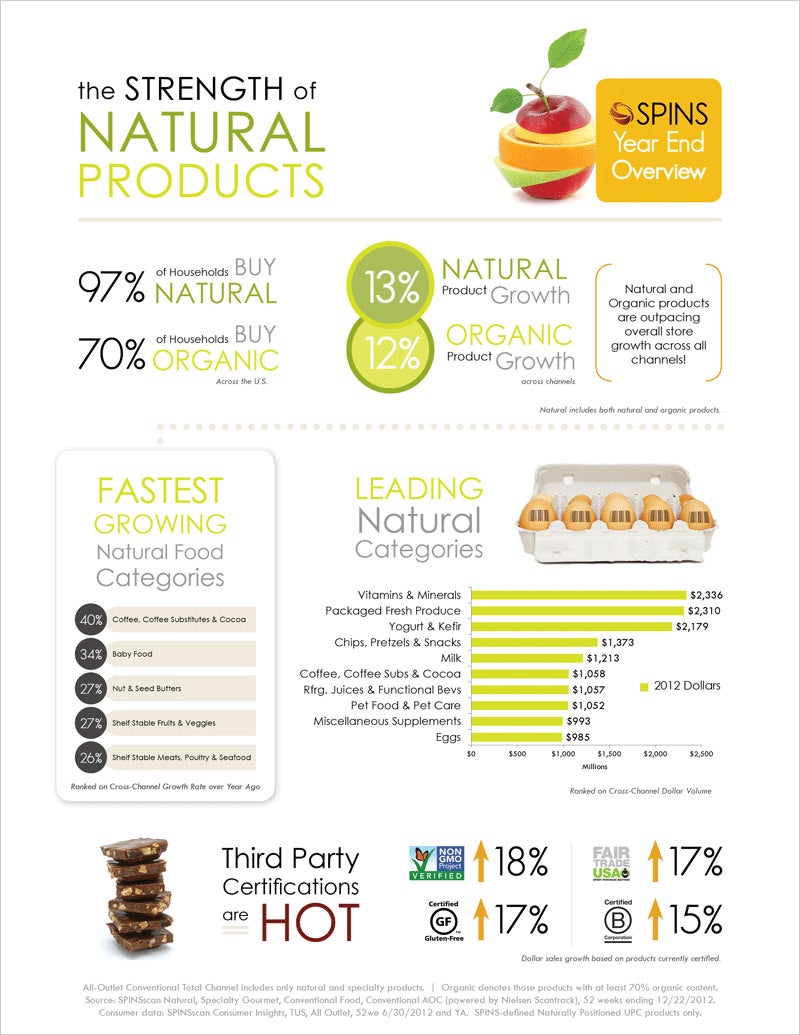Have an Idea for the Next Kale Chip? 3 Tips for Success in the Natural and Organic Industry (Infographic)
Opinions expressed by Entrepreneur contributors are their own.
The kale chip is just one of the more recent success stories in the fast-growing business niche of natural and organic foods and products. Entrepreneurs with new business ideas can still get their slice of the pie.
The natural and organic world has been growing for almost two decades as consumers become increasingly aware of what they are putting into and on their bodies, says Tony Olson, the owner and CEO of SPINS, a Schaumburg, Ill.-based company that tracks the industry.
From granola to coffee, U.S. consumers spent more than $36 billion last year on natural and organic foods and products. “What you are seeing is kind of a revolution in consumer interest in the product they are putting into their bodies and the quality of the ingredients, growing practices, all the things that our industry stands for,” says Olson.
For example, in 2012 they spent more than $2.3 billion on natural and organic vitamins and minerals and another $2.3 billion on packaged, fresh produce, SPINS reports. The fastest-growing category was coffee, coffee substitute products and cocoa, which shot up 40 percent in 2012 to more than $1 billion. The infographic produced by SPINS (below) has more details on segments of the industry.
Related: B Corps: The Next Generation of Company?
Natural products have no artificial flavors, colorings and preservatives. Organic products are a subset of the category and adhere to strict growing standards that are healthy for the consumer and sustainable for the environment. If you’re chewing on a business idea in the niche, keep the following three tips in mind.
- Be clear with your consumers. Buyers of natural and organic products want to know where the ingredients came from, whether the manufacturing process was environmentally sustainable and how employees that make the product are treated. Be sure you are authentic and transparent, says Olson.
- Put a fresh spin on a popular classic. Differentiate yourself, says Olson. The “pretzels, chips and snacks” category is one of the most popular in the niche, but the recent explosion of kale chips is an example of how to find space in an already-crowded area, says Olson.
Related: Why Eco-Conscious Entrepreneurs Like Method View B Corp as a Badge of Honor - Get an independent vote of confidence. The surge in popularity of natural and organic products has left some consumers feeling overwhelmed with choices. As a startup, one of your most challenging barriers will be earning customers’ trust in your product and your brand.
One way to do that is to apply for an independent, third-party audit of your product and your company, says Olson. There are several types of these certification programs, including Fair Trade, which certifies those products that have been produced at farms where the workers are treated fairly, and Certified Gluten-Free, which approves those brands which it determines meet rigorous gluten-free standards. Third-party certifications can be worth the extra time and money needed to secure them, says Olson.

The kale chip is just one of the more recent success stories in the fast-growing business niche of natural and organic foods and products. Entrepreneurs with new business ideas can still get their slice of the pie.
The natural and organic world has been growing for almost two decades as consumers become increasingly aware of what they are putting into and on their bodies, says Tony Olson, the owner and CEO of SPINS, a Schaumburg, Ill.-based company that tracks the industry.
From granola to coffee, U.S. consumers spent more than $36 billion last year on natural and organic foods and products. “What you are seeing is kind of a revolution in consumer interest in the product they are putting into their bodies and the quality of the ingredients, growing practices, all the things that our industry stands for,” says Olson.





